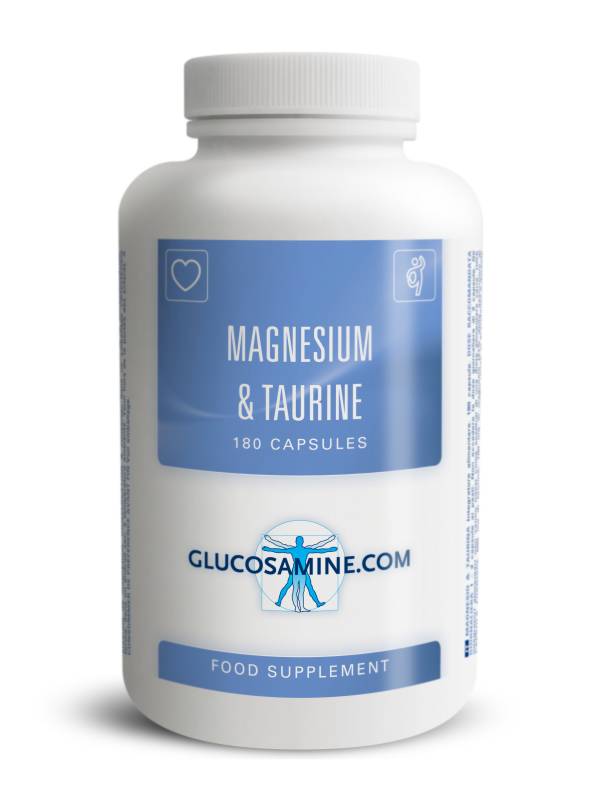This website uses functional cookies. If you click 'Accept', we also use analytical cookies (see our privacy page). If you prefer not to, click 'Decline'.


Magnesium is a mineral. It is a substance which we cannot produce ourselves but must extract from the diet. This is why magnesium is called an 'essential nutrient'. Magnesium plays an important role in reducing mental and physical tiredness.
Magnesium is a mineral which is involved in many processes in the body. Among other benefits, it contributes to the following:
Adult people need about 375 milligrams of magnesium per day. These 375 mg represent the so-called 'recommended daily allowance' (RDA). The RDA is the amount of a nutrient that, when taken daily, prevents symptoms (of disease) due to shortage. Each capsule of Magnesium & Taurine contains 100 mg of magnesium.
Ask Kris Kuiper, MSc,
exercise physiologist


A varied diet which is rich in unprocessed foods provides enough magnesium. The best sources of magnesium are:
Unfortunately nowadays, all too often we eat processed foods which contain less vitamins and minerals than the original source. In addition, medicines and stress can increase the mineral requirement. A magnesium supplement can provide a solution to this.
Non-wholegrain bread, added sugars, starch, and many 'colourless vegetable oils' are foods which have been obtained by processing whole foods. Processing strips the foods of a great deal of their colour, smell, and taste. The processed foods form the basis of ready-made meals which are flavoured with salt and flavourings.
Unfortunately, processed foods contain the same quantity of calories but far less vitamins and minerals compared to the original source. The amount of magnesium in these foods is also much less. It is therefore very important to choose unprocessed whole foods as much as possible.
There are more factors that can alter the magnesium balance in the body, apart from eating too much processed food. There are dozens of medicines that increase the use of this important mineral. Among others, the contraceptive pill and diuretics - otherwise known as 'water tablets'.
In addition, stress also increases the body's magnesium requirement. Research has revealed that exposure to loud noise for a few hours results in increased urine excretion of magnesium during two days. It has also been shown that people who are exposed to chronic stress have a lower level of magnesium in their bodies.

By choosing Magnesium & Taurine you are choosing quality. We can guarantee it in the following way:
Safe product. The producers fulfill GMP and HACCP requirements. This means that they follow strict procedures which ensure food safety and hygiene.
Independently tested. The end product is randomly tested for heavy metals and biological pollutants by the independent laboratory NutriControl. Click on the microscope symbol below for the most recent test results. Read more about the independent laboratory tests here.
Capsule form. Magnesium & Taurine comes in capsules instead of tablets. Capsules are absorbed more quickly and have less chance of causing gastric hypersensitivity. Another advantage of capsules is that they are easier to swallow than rough capsules with hard edges. Whoever does not want to or cannot take the capsules, can easily open them and use only the powder.
Specialist since 2000. Glucosamine.com is a specialist in dietary supplements. The company was founded in 2000 by exercise physiologist and human movement scientist Kris Kuiper and has developed several unique supplements since then. Plenty of knowledge and experience is available about the effect and the safety of these supplements.


Taurine is an amino acid. The body can produce this amino acid itself but can also obtain it from the diet. Good sources of taurine are meat and fish (on average 50 mg per 100 grams).
Taurine fulfils various roles in the human body. One of taurine's functions is to maintain the balance of minerals in cells. It keeps the magnesium in the cells and the calcium out of the cells, among other actions. The mineral balance is important for the contraction of muscle cells. Taurine controls the contractile strength of the heart muscle through the balance of minerals.
Taurine can be replenished by means of a taurine supplement as well as through diet. Each capsule of Magnesium & Taurine contains 500 mg of taurine.





180 capsules each containing 100 mg of magnesium (26.7% of RDA) and 500 mg of taurine.
The 100 mg of magnesium proceeds from 250 mg of magnesium citrate and 100 mg of magnesium oxide. Read below under 'The ideal magnesium combination' why these two forms have been consciously chosen.
Free of gluten, milk, lactose and artificial aromas and colourants.
Recommended daily intake:
The capsules may be taken simultaneously or distributed throughout the day. It is preferable to take the capsules at mealtime(s) or with plenty of water.
Do not surpass the maximum recommended dosage. Dietary supplements must not be used as a substitute for a varied diet.
Do you have difficulty swallowing capsules? You can open the capsule by separating the two halves and just use the powder. You can combine it with water, fruit juice, or yoghurt, for instance.
Possible side effects
High dosages of magnesium have a laxative effect. Magnesium & Taurine will only exceptionally have a laxative effect at the recommended dosage. If this happens, spreading the intake throughout the day can provide a solution.
Contraindications and warnings
If you are taking medicines, following medical treatment, or have kidney problems, you must discuss the use of this supplement with a doctor.
Do not take during pregnancy or the breastfeeding period.
We have consciously chosen to use both magnesium citrate and magnesium oxide in our product. There are many magnesium compounds which are reported to be the most effectively absorbed. It is reported that about 90% of magnesium citrate and magnesium lactate are absorbed. In contrast, it is reported that only 25% of magnesium oxide is absorbed.
What almost nobody knows is that the absorption of magnesium is always measured during a relatively short period of time in scientific studies. Measurements are usually stopped after about 4 hours. In a fairly recent study, the absorption was measured for a period of two days after intake. This study identified that magnesium oxide is as well absorbed as the forms that are 'more easily absorbed'. It just takes a lot longer!
Magnesium oxide can be seen as a 'slow release' form of magnesium, which has the advantage that it contains 4 to 6 more times magnesium per gram than most other magnesium compounds. In addition, the alkaline magnesium oxide results in far fewer gastrointestinal issues than for instance the acid magnesium citrate. In the combination we have chosen, magnesium oxide 'neutralizes' the acid magnesium citrate, so to speak. An ideal combination.

